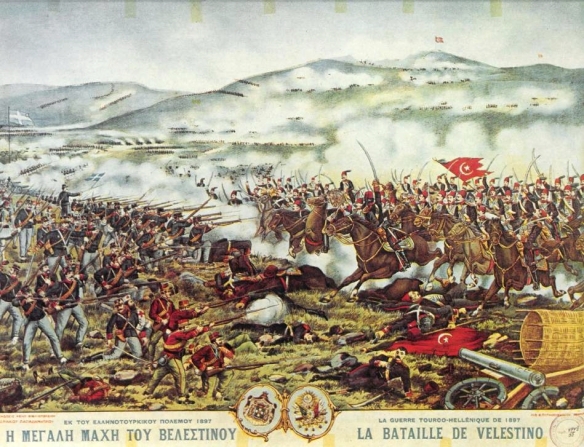
Greek troops in Thessaly. The inadequately prepared Greek combat forces numbered around 100,000 men, of which approximately 500 were lost. In comparison, Turkish forces numbered around 400,000, with 1,500 losses.
Brief war won by Turkey but also benefiting Greece due to the intervention of major European powers. The Greco–Turkish War of 1897 ended in an easy victory for Turkey. It began in April 1897 with clashes across the Greco–Turkish border, which at the time ran between Thessaly and Ottoman-held Macedonia. The hostilities ended in May 1897 when the Turkish army drove the Greeks back deep into Greek territory.
The war grew out of tension between Greece and Turkey that was fueled by a Greek uprising on the Ottoman-controlled island of Crete. Calling for a more dynamic stance by Greece toward Turkey, the Greek nationalist organization Ethniké Hetairia (National Association) orchestrated an incursion into Turkish territory by Greek irregular troops (March 1897), apparently with the knowledge of the Greek government. Although Turkish forces repulsed the irregulars, the incident led to a break in diplomatic relations between Greece and Turkey and a massing of their respective armies on the mountainous frontier between Greek Thessaly and Ottoman Epirus and Macedonia.
The Greek army, consisting of two divisions, was unable to capitalize on its early incursions across the Macedonia–Thessaly border and suffered defeats in several battles around the mountain passes between Macedonia and Thessaly south of Mount Olympus. The Greek front collapsed on 12 April 1897, and the Greek forces began to retreat into the Thessalian plain. Within two weeks and with little resistance, the Turkish army controlled all of Thessaly, including its major towns of Larissa and Volos. There was relatively little activity on the western front in Epirus, where the Turkish army successfully repulsed the Greek offensive.
The war came to an end when the advancing Turkish army scored another two victories in battles on the mountains that divide the Thessalian plain from the rest of Greece, thus consolidating its control over Thessaly. The danger that further Greek territories would fall to the Ottomans prompted Russia’s Czar Nicholas II, with the support of other European governments, to intervene and persuade Sultan Abdülhamit to agree to a cease-fire; it was signed by the combatants on 7 May 1897, although the end of the war was not formally agreed upon by the Greek and Turkish governments until November 1897. Because of the involvement of Russia and the other European powers in the resolution of the conflict, the Ottoman Empire gained very little from its victory except monetary compensation and slight changes to its borderline that it considered strategically advantageous. In an important gesture that served to acknowledge Greece’s original grievances, the European powers prevailed upon Abdühamit to accept previously Ottoman-ruled Crete as an autonomous region.
Bibliography Dakin, Douglas. The Greek Struggle in Macedonia, 1897–1913. Thessaloniki, Greece: Institute for Balkan Studies, 1993.